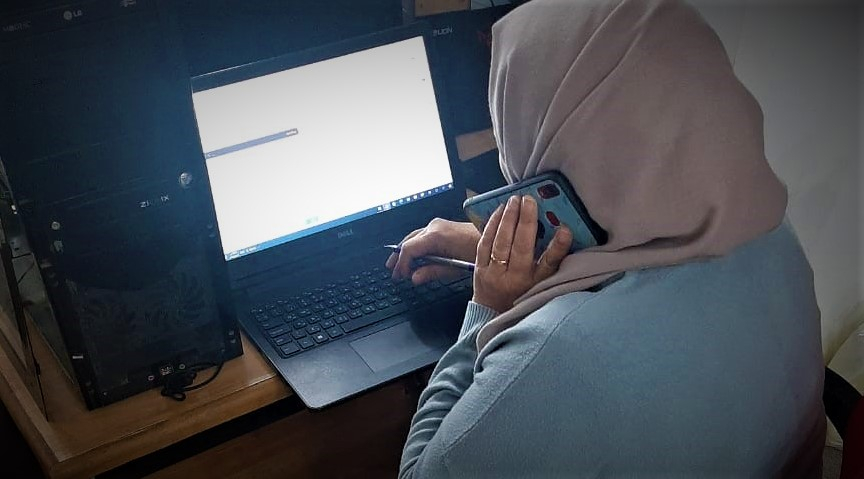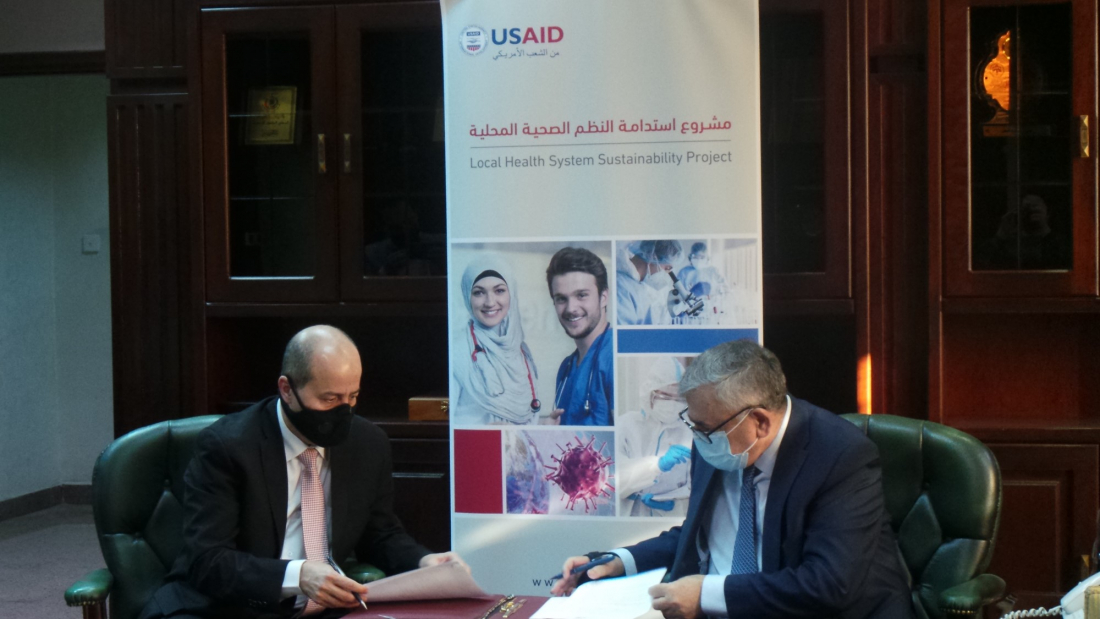COVID-19 Call Center Nurses Are Helping Families in Jordan Stay Healthy at Home
Subtitle
Patients grateful for telecounseling calls
Patients grateful for telecounseling calls
Date

Call Center nurse Eman Abu Yousef speaks with a COVID-19 patient.
When a phone call goes well for Tasneem Al Zghoul, a nurse working with the Jordan Ministry of Health’s COVID-19 Call Center, it can be a lifeline for the person on the other end.
In January 2021, as Jordan encountered its second and most devastating wave of the pandemic, the ministry scaled up its efforts to reach people who tested positive with timely and life-saving information. Such follow-up is considered critical to curbing the pandemic, and for its success, each conversation must be handled delicately.
“I remember speaking to a woman who was living with her parents who are both fighting cancer. She was scared and asked me what she should do to avoid giving the virus to her parents,” said Ms. Al Zghoul. “I explained to her what to do and calmed her down. Afterward, she was relieved and thanked me for my support.”
Two hundred nurses trained
USAID’s Local Health System Sustainability Project (LHSS) supported the Ministry of Health’s initiative by bringing in the Jordan Nurses and Midwives Council to recruit and train 200 nurses to work at the Call Center. The training covered communication techniques, counseling skills, and the ministry’s guidance for keeping people with non-severe symptoms at home and safe to prevent hospitals and clinics from being overrun.
LHSS collaborated with the ministry to develop tools for nurses to use during telecounseling calls, including a checklist, call scripts, and responses to frequently asked questions. To enable the nurses to work from home during the pandemic, the project provided them each with a mobile phone, a tablet to input and track caller information, and internet access. Most of the call center nurses are women and they appreciate working from home with flexible hours, especially those homeschooling their children during the pandemic.
“Most of the COVID-19 patients I call are relieved that someone is checking on them - Nurse Ra’ofah Al Salhi
Telecounseling calls have been underway since January, with nurses now making 3,000-4,000 calls a day to reach Jordanians who have tested positive for the virus. Call Center nurses are informing people of their test results and identifying those that need referrals to hospitals. They are discussing isolation, quarantine, and home care, and obtaining information about contacts of infected individuals so epidemiological surveillance teams can follow up with those contacts. The nurses are also making follow-up calls five and ten days after the positive test to monitor patients’ symptoms and provide referrals for care.
“I feel most of the COVID-19 patients I call are relieved that someone is checking on their health condition,” said Call Center nurse Ra’ofah Al Salhi. “They take my advice to drink plenty of fluids, take vitamins, or isolate themselves at home very seriously. They thank me at the end of the call and some of them, especially elderly patients, ask me to call again the next day,” she said.
Quality and sustainability
To ensure continued high-quality telecounseling, the LHSS and the Nurses and Midwives Council trained four supervisors to provide quality assurance and follow-up to Call Center nurses. LHSS also supports ongoing improvements in the Call Center data system, like enabling nurses to review and correct data entries on their tablets before submitting them. These efforts are enabling surveillance teams to follow up with patients and their contacts more quickly and efficiently.
The Call Center program is helping contain the spread of COVID-19 at a critical time in Jordan. It has also resulted in a fruitful new public-private partnership between the Jordan Nurses and Midwives Council and the Ministry of Health. LHSS plans to extend its contract with the council to hire an additional 200 nurses and 8 supervisors for the Call Center.

Nurses and Midwives Council President Khaled Rababa’h, left, and Minister of Health Nathir Obeidat at the Call Center signing ceremony on Jan. 7, 2021.
